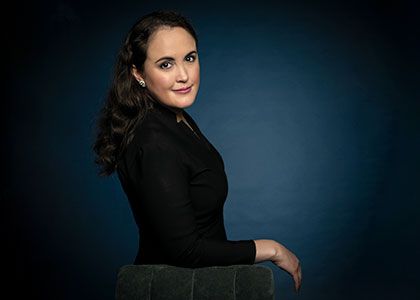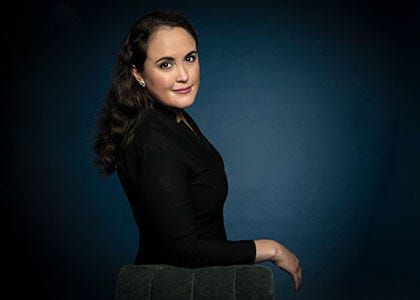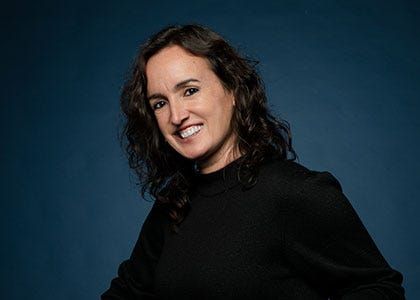A las personas con discapacidad en México les faltan muchas cosas, pero si algo tienen es un superpoder: son invisibles.
Si hoy, en pleno siglo XXI seguimos sin ‘verlos’ en las escuelas, en las empresas, en la calle, en los hoteles, en los aviones, en los parques, mucho peor era en 1976.
Elena Poniatowska tenía 46 años cuando aceptó la invitación a que entrevistara a Gabriela Brimmer, una joven de 29 años con parálisis cerebral que le escribió cartas y más cartas con el dedo gordo de su pie izquierdo golpeando las teclas de una máquina de escribir bautizada Che Guevara.
“La primera vez que vi a Gaby, no me atreví ni a mirarla. Me desconcertaban sus espasmos, el hecho de que se arqueara en la silla o echara totalmente la cabeza para atrás”
“Estamos tan acostumbrados a que la comunicación humana se haga según los cánones establecidos, por los únicos caminos recorridos, que no intentamos ninguna otra.”
“La necesidad de Gaby de sentirse mirada en otros ojos es grande”
Son frases del libro Gaby Brimmer. Un libro que ella no pensaba nunca escribir.
La primera entrevista juntas se publicó en el periódico en el que colaboraba.
“Bueno, ya estuvo, ya salió, yo también tengo mi costal que cargar, lo de Gaby no me atañe”.
Pero la dueña del Che quería un libro, quería que su lucha por defender los derechos de las personas con discapacidad de acceder a la educación estándar, de impulsar la inclusión en las aulas y no en instituciones especiales, se tenía que conocer.
Le costaba mucho escribir. A duras penas en los días buenos podía avanzar unas siete páginas. Sus manos, su motor, su confidente, su mástil donde amarrarse en las tormentas era Florencia, una empleada doméstica oaxaqueña que apenas la conoció de niña en su casa de la Condesa, y ya nunca más pudo separarse de ella. Fue más poderosa esta relación que la que tuvo con su madre. Y Elena había dicho que sí al libro, pero era una situación incómoda, que requería de mucho esfuerzo, que la alejaba del mundo literario donde estaba floreciendo.
La situación de Gaby le recordaba dolorosamente a su sobrino Alejandro, quien en un accidente por esos años había quedado también con una discapacidad profunda que solo le permitía comunicarse tocando con su dedo un alfabeto de papel.
Muchos de sus amigos le recomendaron no tomar esta aventura. Pero –en el prólogo lo recuerda– los ojos verdes de Gaby la perseguían. Y dos años más tarde de la primera reunión publicó un libro que es en realidad un diálogo entre dos mujeres sumamente sensibles, inteligentes, dos corazones con necesidad de dejar un legado en letras, un juego que le daría a Gaby la posibilidad de quitarse ese superpoder de la invisibilidad.
“Quizá Gaby Brimmer les abra los ojos a los sanos sobre los miles de inválidos que hacemos a un lado porque creemos que no tienen conciencia. Más allá de la silla de ruedas, está una niña fuerte e inteligente, una chava muy buena onda, alivianada, linda de veras, linda de cuerpo y alma, ¿la ven ustedes?”
Gaby se abrió con Elena, una mujer que, con un oído tierno, mucha paciencia y finalmente cariño genuino, era capaz de captar en el aire las ideas que con dificultad quería decir y convertirlas en un libro.
Y como buena periodista, ella sabía que había una gran historia detrás de la mujer que typeaba con su pie izquierdo, en esta poetisa encerrada en un cuerpo rígido y mecido por el amor de una nana de por vida.
Ese ‘costal’ que afortunadamente no soltó, se convirtió en una obra exitosa que visibilizó a Gaby, a las personas con parálisis cerebral, a las deficiencias del sistema educativo y a la falta de empatía de una sociedad que no acepta nada fuera de lo ‘normal’.
Después de la obra el Elena, Gaby se convirtió en ponente en muchos foros, daba conferencias y comenzó a congregar a un grupo de personas que le ayudaría a crear su propia organización civil (Asociación para los Derechos de Personas con Alteraciones Motoras -ADEPAM-) en 1989.
En 1987 esta historia se convirtió en película, la primera avanzada internacional de Luis Mandoki en Hollywood quien puso a actores internacionales en una película hablada en inglés para sacarla del ‘circuito chico’ y darle visibilidad ahora internacional. La argentina Norma Aleandro que compartía cartel con Liv Ullmann y Rachel Chagall, fue nominada al Oscar como mejor actriz secundaria.
El 3 de mayo de 2019 cuando con Katia D’Artigues y Agustín de Pavia –un abogado con parálisis cerebral– lanzamos el portal www.yotambien.mx invitamos a Elena como madrina. Ella había ‘visibilizado’ la discapacidad exactamente 40 años antes.
Conseguí en Mercado Libre una edición del 79 del libro y lo llevé al evento para que lo firmara.
La admiro por ser tan valiente en contar esta historia que podría no interesarle a nadie.
Mientras escribía con su letra hermosa y garigoleada una dedicatoria me preguntó: “¿Ha cambiado mucho el mundo de las personas con discapacidad desde que conté la historia de Gaby? ¿Ahora sí pueden ir sin problemas a la escuela o a la universidad como ella soñaba?
Me dio tristeza devolverle a su mirada aún inocente con más de ochenta años un NO rotundo.
Me dio rabia no poder decirle que la meta sí se había cumplido y que ahora todos en las personas con discapacidad lo que ella vió en Gaby.
Preferí hacer una mueca que escondía un ojalá.
Ella, tan inteligente como sensible me tomó de la mano y me dijo “pues entonces soy yo la que te admiro”.
@ba_anderson
Las opiniones expresadas son responsabilidad de sus autoras y son absolutamente independientes a la postura y línea editorial de Opinión 51.
Más de 150 opiniones a través de 100 columnistas te esperan por menos de un libro al mes. Suscríbete y sé parte de Opinión 51.





Comments ()